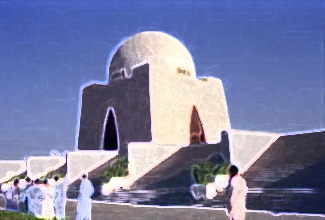|
Rubble(continued) 6. The choppers flew in at dawn on the 12th, and we flew north over total
desolation and ruin. After thirty or so minutes, we were brought down
in what used to be a town square, the remains of a mosque strewn across
adjacent streets. Every building, flattened. Whiffs of smoke and dust still steaming
from piles of rubble ten days after the quake. People, dazed, walking
around or trying to dig through the mess. Yes, I finally knew the meaning
of "total devastation." We'd been given face masks and gloves by the relief workers —
the stench was indescribable. I'd never smelled decaying human flesh
before, never seen a corpse, never seen body parts ripped off, scattered
about so indifferently. The place was so demolished that Rashid lost his bearings and had to
ask an aid worker to point us towards a particular street he named,
one near the mosque. His parent's home. (Jesus, what's that like? A
place so smashed up you can't even recognize where your street or home
is.) The young man, not much older than Rashid, maybe Swiss or German,
led part of the way and then pointed to a group of about ten local men
stretched along the street already, standing on heaps of mortar, broken
brick, and concrete. After an hour of rummaging through rubble, trying to acclimate to the
high altitude, listening to Rashid speaking with the other men —
some, I gathered, were people he remembered from childhood, some were
old family friends — I saw a man running towards us, shouting Rashid's
name. He was about my age, with a scruffy looking Jinnah cap tilted
over his bristly salt and pepper hair. He'd heard Rashid had come home
and was now trotting gingerly over the rubble. He embraced Rashid, kissing
his cheeks, and they both cried. I turned away to give them some privacy,
though we were all out in the baking sun, toiling together — nothing
private about this at all. A few minutes later, Rashid clambered over to me, speaking breathlessly:
"That's a family friend. He says he thought my parents were both
in this house when the quake hit. He hasn't seen them since." He looked terrified. I didn't have to tell him: It was ten days after. Could anyone really
survive under this, under tons of debris? No, I didn't have to say a
word. I was sure my face said it all, and he just looked at me and began
sobbing. Then wailed, the sound rising from his gut and out across the
public square. Some of the other men stopped and scrambled up the mound. One kneeled
down, another put his arm around Rashid, another started a long, drawn-out
keening. Thrust into the middle of this circle without warning, I'd entered
into public grieving. I, who cry at movies, but never let people see;
I, who weep over poems, but never acknowledge it; I, who still get choked
up at sunsets, only when I'm alone. Yes, that Roy, the ever-controlled
Roy, suddenly found himself surrounded by grown men holding each other,
howling, nearly screaming their dirge, throwing hands in the air invoking
the name of Allah. But I looked down and just kept digging near their feet, tossing shards
of wood and brick towards the street, soot and ash flying, trying not
to let anyone see me. Me. Me crying into dust on a mound of rubble, far from home and far too
close. Me.
7. It was over soon: We found nothing, so by the third day (it was now
the 15th), some family friends held a procession. Prayers were said,
more tears were shed, and by evening the helicopter was transporting
us to a base in the central region. A week after we had arrived, we
were back in Karachi, saying our good-byes to Rashid's cousins and taking
the day-long flight back to New York. It was during the leg from Zurich to JFK that Rashid finally spoke.
During the first two connections, he'd been silent, brooding. I let
him be. It seemed best, and it gave me a chance to attempt figuring
what the hell I'd just gone through, if that were possible. How do you
"absorb" such a thing? How the fuck do you understand something
like disaster and death, lives shattered so brutally? It was tempting to stand back and take the clinical approach. That's
easy. Being close from a distance is an art: Yeah, there I am —
steady, stable Roy — always there for people, waving, beaming at
you, but from my side of the picket fence. In my living room, I've cried at end of The Wizard of Oz, for
Christ's sake — "O, Auntie Em, there's no place like home."
And I even let it pour back in Chibol, but since then, I was leaning
on old habits. Warm, understanding Roy receiving his farewells from
the cousins in Karachi: "May Allah always bless you" and "You're
such a good man." Gentle Roy, guiding Rashid through the terminals
in Istanbul and Zurich. Yes, there for others. On my side of the fence. But after two flight's worth of silence, after flying over half a world,
I didn't want "easy" anymore. I was tired of "easy."
"Easy" didn't work. So when Rashid opened his mouth for the
first time as we were flying over the Atlantic, I made a decision. I
don't know when I made it, but I knew I'd made it because when he said,
"Thank you," so quietly, still looking at the distant waves
below, I put my hand on his. He turned. And before either of us could
say a word, I rested my head on his shoulder. There. Right in front
of a plane full of strangers. He didn't budge, and after a few minutes,
I fell asleep. On his side of the fence. |
